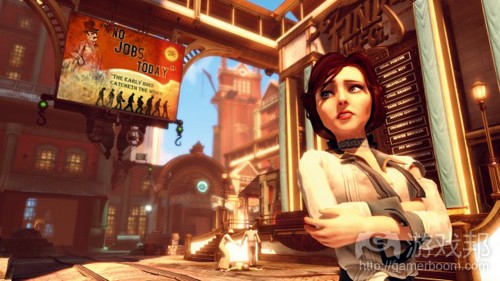Tadhg Kelly称游戏应具有艺术可信度
作者:Tadhg Kelly
我再也玩不了鼠标加键盘操作的游戏了。大约13年以前,我的后背和肩部受伤了——是因为我瑜伽训练不当,伤了手臂和手掌的家庭神经。神经痛时不时发作,基本上取决于手受到的拉力和我去看整骨医生的频率。每当我把手指放在WASD四个键上玩游戏,之后我总是会后悔。
但有时候,发现值得冒险一玩的游戏,我就顾不上后悔了。最近,让我又手痒痒的游戏是《生化奇兵之无限》,我在Twitter上已经热情地讨论这款游戏一周了,为了玩它,我在我的苹果机上安装了Windows系统。
当游戏在我的视网膜屏幕上全屏运行时,我觉得我就像看到了奇观,它是如此美丽,普通的下雨场景都让我目不转睛。我就像喝了酒似的,在云中漫步,穿过街道,看游戏世界中的建筑拔地而起。
这让我想起19年以前我第一次玩《毁灭战士》看到Phobos的情景,或者《骇客任务》中的纽约,又或者《战地1942》中的复活岛。透过距离眼前三英尺的屏幕(非常不同于在游戏机或电视上看到的)看见一个世界、沉浸其中,惊慌失措、四下张望、担心弹药所剩无几,真是一种熟悉的感觉。
因为我移民到美国还不久,我经常想到一句话“你再也回不了家了。”我移民了两次,第一次是从爱尔兰的都柏林到英国的伦敦;第二次就是最近从英国伦敦到美国的西雅图。我想念以前呆过的那两座城市,我把它们当作我的家。但我再也回不去了。
不同的部分让你感到怪异,相同的部分让你感到气愤。这是我玩《生化奇兵之无限》的感觉。画面那种怀旧的感觉让我越来越觉得怪异。同时,与世界的交互作用也绝对是消极的。
走到对你缓慢地重复相同的语句的游戏角色面前,不断寻找尸体和偷钱的任务,走进杜莎夫人蜡像馆后找到武器赎买机和升级道具,这些东西可能很华丽,但并没有什么实在意义,且故事的深度其实并不比《Rise Of The Triads》高多少。
一旦游戏显示出现实主义的一面,玩家就会质疑框架(机制,等)的实用性。太抽象的修辞似乎与过去的并无区别,所以根本问题就变成,这种老式的射击游戏玩法还值得做吗?好吧,也许足以消遣时间。
除了手腕痛,我的问题是,我以前就见过这类问题了。尽管我尝试,我仍然无法让自己像过去那么容易相信、那么容忍游戏中必不可免的漏洞。1995年时,我可以无视《上古卷轴》中的系统错误百出,但到2013年,我就不能接受了。
不只是在射击游戏中,我发现我的期待在变化。我发现RPG也被夸大了——这是一个《地下城与龙》资深玩家的想法。我觉得竞速游戏非常一般。最近新推出的几个科幻杂志风格的交互美术作品(游戏)也许比我20年以前的看到的东西还无聊,因为它们的想法太平淡无奇了。
我相信游戏,但我发现我年轻时玩的游戏已经不能再吸引我了。对于更年轻的一代,毫无疑问在游戏中玩什么才是最重要的。但对我而言,随着年纪增长,我越来越倾向于从高雅、稳健和连贯这些角度审视游戏。我认为游戏应该通过简单的交互作用和艺术感来传达和延伸乐趣、快乐。
我说的是《Rez》和《Journey》这类游戏,以及《三重小镇》、《Papers, Please》这种iPad游戏。我认为这些游戏中有一种超越沉浸感的连贯的可信度。我的意思是,我想玩的游戏应该是用最好的机制构建起世界,让玩家从小东西上发现乐趣。
游戏是一种力量,是一种独一无二的感觉,让人们相信在物理界限之外,也许存在着一个不一样的世界。只要游戏是可信的,最简单的行为也能产生无穷的深意。只要游戏框架不会很快变得浮于表面。
随着成长,我发现自己越来越赞同游戏作为艺术这一新说法。在我们创造的那些数字化的世界里,所有人都为它所具有的创造另一个世界的魔力感到不可思议。(本文为游戏邦/gamerboom.com编译,拒绝任何不保留版权的转载,如需转载请联系:游戏邦)
What Games Are: Bioshock Infinite and that old ‘pew pew pew’ feeling
by Tadhg Kelly
Playing mouse-and-keyboard games is something I really can’t do any more. About 13 years ago I injured my back and shoulders – a case of overenthusiastic yoga – and developed a sciatica-like condition in my hands and arms. It comes and goes, mostly depending on strain and how often I get to an osteopath. But when I hold my fingers like a cat perched over my WASD, I later regret it.
But sometimes I give it a go anyway, because a game comes out that I think is worth risking it for. Recently, it was BioShock Infinite, a game that my Twitter feed raved about for a week. I installed a Windows partition on my Mac just to play it.
And what a marvel it was to behold. It ran at full resolution on my Retina-enabled screen (an incredible 2,880×1,800 for those keeping score) and it was so beautiful that it was the kind of game that made me stop and look at raindrops. The sort of view that onomatopoeia would call ‘lush’. I drank it in, wandered through the streets, watching whole buildings bob up and down among the clouds.
It felt like that first time I stared out over the landscape of Phobos when playing Doom 19 years ago, or New York in Deus Ex, or Wake Island in Battlefield 1942. That old feeling of walking through a world seen through a screen three feet from your face (it’s not quite the same as on console and TV), drinking it in, getting scared, peeking around corners and wondering how much ammunition you have left.
Yet as a recent immigrant to the US, I find myself thinking on the phrase, “You can never go home.” I’ve moved country twice, once from Dublin to London for over ten years; more recently (by dint of the Green Card lottery) to Seattle. I miss both cities equally and consider both my home. But you can’t ever go back, not really.
When you do it’s different, but also the same. The different bits weird you out and the samey bits irritate you endlessly. And that’s also how I feel playing BioShock. The nostalgia of its beauty kind of weirds me out a little, with bloom upon bloom. Meanwhile, the valence of interaction with the world is decidedly in the negative.
That experience of walking up to videogame characters that inertly repeat stock phrases at you. That business of endlessly searching bodies and stealing every pfennig you find. That sensation of walking through a digital Madame Tussauds and finding weapon-vending machines and upgrade powers that make little sense. That realisation that it may look glorious, but really the depth of the fiction is no greater than was that of Rise Of The Triads and its priest porridge health pickups.
And once realisation dawns, the question that arises is whether the frame (the mechanics, etc) is any good, because that’s all there really is. As high-definition tropes reveal themselves to be much the same as the tropes of yesteryear, it comes down to whether the old ‘pew pew pew’ of shooting gameplay is worth doing. It’s all right. Enough to pass the time.
Aside from wrist pains, my problem is that I’ve seen this all before. Although I try, I find that I cannot go back to a time when I used to have the ability to believe more easily, and was more tolerant of the bugs, breaks, sops and cheesy nods to necessity in games. Where I might have considered the breakability of the system in an Elder Scrolls game something to be ignored in 1995, in 2013 it jarred me.
And it’s not just shooters where I find my expectations changing. I find roleplaying games awfully bombastic – and this from a guy who was a D&D fiend into his mid-20s. I find racing games very so-so. I find several of the newly minted ‘zine’ style of interactive artwork perhaps a little less interesting than I might have two decades ago, because their messages are rather obvious.
I believe in games, but I find that the games of my youth no longer interest me. For the younger generation, no doubt what it is playing all feels so very significant right now. Yet for me, I find that as I grow older I become more and more fascinated by elegance, robustness and coherence. I want games about the simple interaction leading to extended fun and delight, delivered with artistry.
I’m talking about games like Rez and Journey, iPad games like Triple Town and contained games like Papers, Please. I’m talking about what I’ve often called ‘thauma’, a sense of coherent believability that goes beyond immersion or flow. I’m talking about wanting to play in the leanest of worlds with the most wonderful mechanics, and finding joy in small things.
There is power in playing and a numinous sense unique to games that arises from knowing that a world might exist beyond its physical boundaries. There is incalculable depth of meaning to be derived from the simplest action as long as it is robust. As long as the frame does not become apparent quickly.
The old ‘pew pew pew’ is probably better kept in the nostalgia file. As I grow older, I find my continued love affair with games-as-art goes in new directions. There is magic in those digital worlds we make, for all ages, and that magic is often surprising in how much it does with so little.(source:edge-online)
上一篇:开发者应该摒弃过时的用户观念










































 闽公网安备35020302001549号
闽公网安备35020302001549号